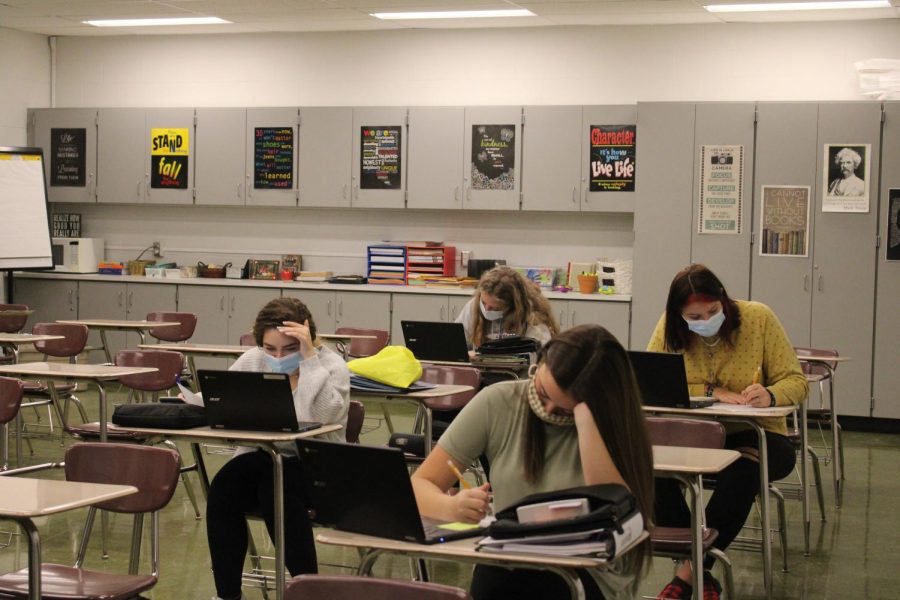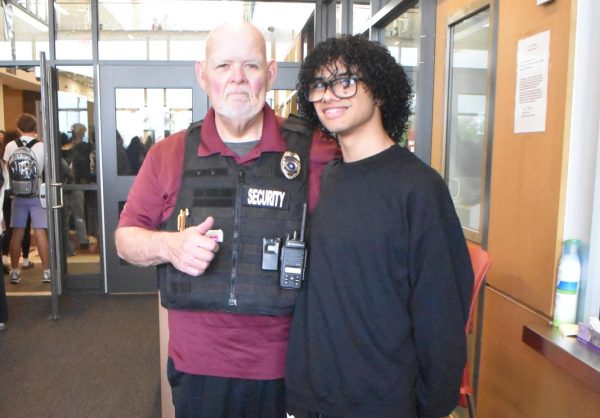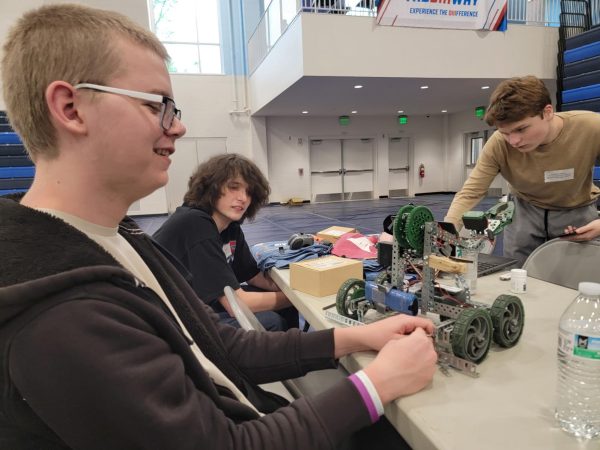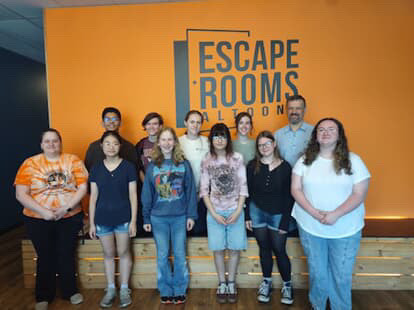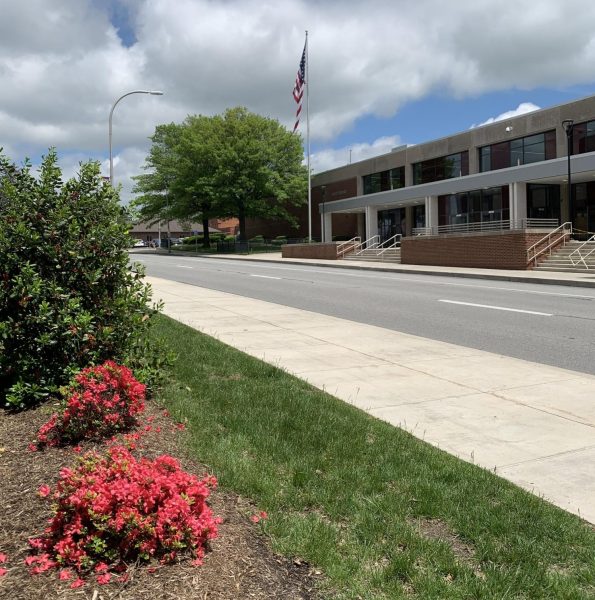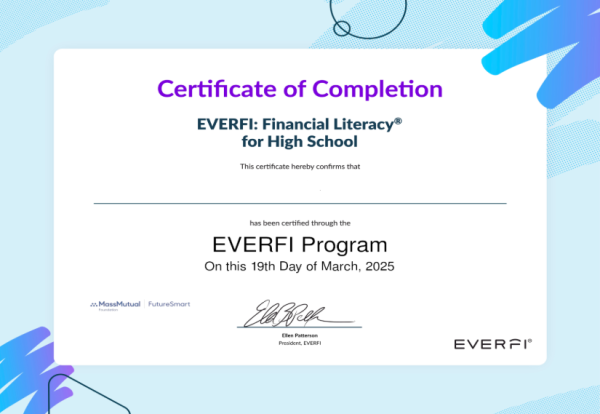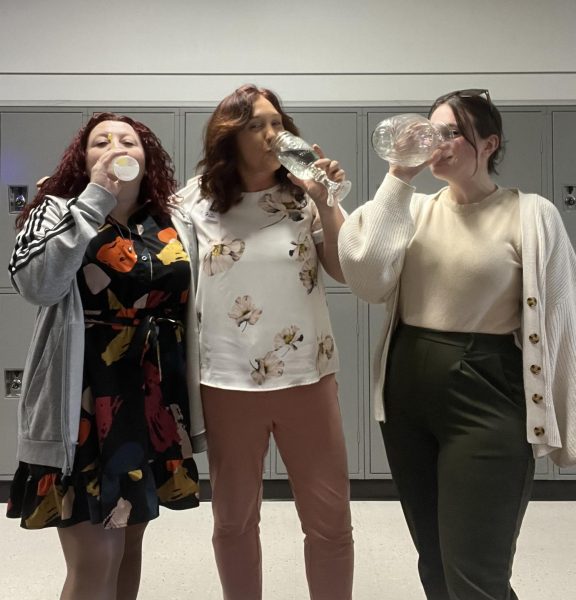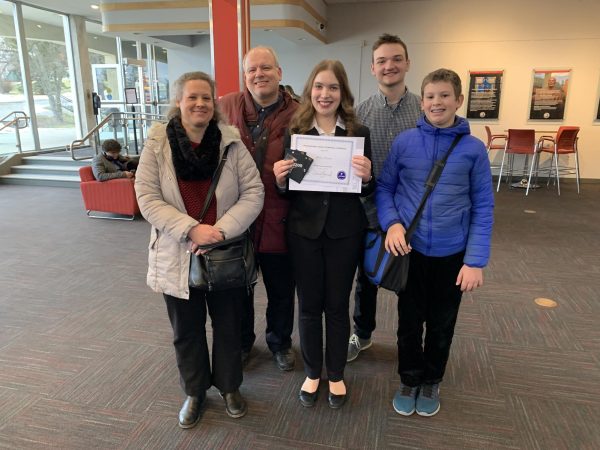Teachers continue with grad project despite it no longer being required
An update of the grad project and why teachers are still continuing despite the school board’s decision.
Working hard. Despite the school board’s decision regarding the senior projects, English classes are still continuing these and working on them. But, the decision does offer students some benefits. “We are business as usual with the project, but the decision eliminates some of the stress involved with having to fulfill the project as a requirement for graduation,” English 12 teacher David McCarter said.
On Tuesday, Feb. 16, the school board decided that the senior English projects would not be required for student graduation. This recent decision has caused many teachers to re-evaluate how they would usually go about these projects, however, most of the English teachers are continuing the project with their students.
An explanation of the grad project
Every year, senior students are required to complete an English graduation project. Students must pass this project in order to graduate from high school.
English teachers can individually decide when this project is given to their students and what options their students can choose from. All teachers have a school wide rubric, this way, students at all levels are graded and treated fairly.
For AP and Honors English, students are usually required to write a research paper along with an oral presentation of said paper.
For Academic and General English classes, usually, students are required to pick one of the three options: a traditional four to six page research paper, 25 hours of community service time or a non-traditional project (essentially meaning anything that doesn’t fit into the first two options).
Why teachers are still continuing with the project
Although the senior project is no longer required for students in order to graduate, English teachers are still continuing with the project.
The reason why English teachers are continuing, is in their words, simple: the project provides students life skills that will be useful after high school.
“Everybody needs to have basic research skills. Particularly going on the internet, a lot of people don’t know how to distinguish between what is good information and what is bad information. So, one of the skills you learn while doing research is how to find good sources on the internet and understand when there is bias. I think that is a really essential life skill and everyone needs to do that,” AP English teacher Jennifer Lowe said. “Plus, just communicating effectively is a basic life skill. Maybe you are not going to write research papers in the proper documentation for the rest of your life or do formal presentations, but, just that comfortability and knowing how to communicate yourself in writing and verbally is an important skill to learn.”
For students that want to or plan on attending college after high school, the project continuation is what many of the teachers believe to be beneficial.
“It’s very important to prepare for college. College writing [consists of] taking a position on an issue, arguing it, backing it up with reliable facts, statistics, anecdotal information from experts, citing sources appropriately and being a responsible writer by not plagiarizing. The senior project covers all of this,” Academic English teacher Heather Tippett-Wertz said.
The project also is important for any future careers students wish to pursue after high school, not just for those going to college.
“…the topics deal with a lot of information about careers that students are interested in and may spend years of their life doing. [I]t is typically of great interest to students,” English 12 teacher David McCarter said.
For Academic and English 12 teacher Tabatha Quinn, she focused the project around the students, wanting to support their needs.
“Not every student is going to go to college, not every student is going to be an English major. We have to look back and say, ‘what we can do for our students so that they can use this in their application to life?'” Quinn said.
Quinn’s student teacher Trina Ray, a Master of Education student at Penn State University, has observed how Altoona students will differ from other schools because of this project.
“I’m really appreciative and happy to see that all these English teachers are still requiring students to [continue with the project] despite the pandemic, despite hybrid education,” Ray said. “There is so much conversation going around about the kind of gaps in learning that are going to manifest next year due to online learning, but all these students in Altoona are still going to have that rigorous preparation for doing research.”
Another one of Quinn’s student teachers, Mariam Lee, believes the senior project is a great way for students to study what they are interested in, which is something she loved seeing.
“I just really enjoy seeing the process…with the way Mrs. Quinn had the pacing laid out, I think it was really easy for the students to keep track of themselves and, for the most part, they did,” Lee said. “One student wrote about six pages of the actual written essay and to see how intricate that was and how interested he was in doing this—I could tell he really wanted to write it. It was great just seeing how the students really enjoyed writing. Overall, I just loved working with the students on their papers.”
Why the school board’s decision helps the students
Although Lowe and her AP students are currently working on their projects, Lowe’s General English classes finished their projects early in the fall. Like Lowe, some English classes have already finished their projects as well, yet, this decision still benefits them and their students.
“I think [the school board decision] helps the students that are struggling. I’m realizing seeing people back for a couple of weeks, the huge impact it has on just your psyche to be around people and have a routine again. There is a segment of students who, like my English students who are struggling in the fall and didn’t do the grad project, that this [decision] really threw them a lifeline. It doesn’t seem as overwhelming and they just have to focus on what they need to do to normally graduate without adding an extra requirement…an extra level of stress that nobody needs,” Lowe said.
Quinn’s English classes have also finished their senior projects before the school board’s decision; however, this decision has still helped students who have needed extensions.
“…some of my students, I will attest to, are saying that they are taking care of their siblings; they have younger siblings and are working with siblings that are special needs and they have been doing this for over a year now. I can empathize with these families who have lost their jobs …I do have a number of students that have extensions because they fit that. And, yes, they are relieved that it is not a requirement anymore and is only seen as a class grade. I deeply, deeply can understand where they are coming from,” Quinn said.
For Tippett-Wertz, the project would have looked the same whether or not it was required for graduation. Yet, the project not being a requirement does help the students feel less overwhelmed and less stressed overall.
“In the past, if a student did really poorly, that was reflected on the transcript and it followed them into college…Even though the actual project is pretty much the same, just the pressure of knowing…It’s really nice just to know that ‘hey, this is not required for me to graduate,’ even though the students would do just as well knowing that it wasn’t required. But, for sure, the pressure is off,” Tippett-Wertz said.
The project adjustments and grading differences
For those English classes that would normally participate in the community service or non-traditional options, the pandemic made it difficult for many to do so, which was disheartening for some of the teachers.
“I kind of feel like the students have been robbed of that option, not to say that they can’t go out and volunteer, but it’s hard now. It’s hard to find places that will allow volunteers given the current circumstances. So, I do feel sorry for students…I feel that so many life skills are learned through organizing an event. Time management skills, organizational skills, communication skills—all of these things…It saddens me but I know that the students are still learning some skills,” Tippett-Wertz said.
Despite the difficulty of finding volunteer work, Quinn and her English students were still able to participate in the non-traditional aspect of the project.
“We had so many students reach out and do non-traditional projects. For example, we had the continuation of acts of kindness where students would contact grocery stores or businesses and write letters requesting small donations,” Quinn said.
However, for Tippett-Wertz, she made it clear that her students would not be able to do any of the non-traditional or community service options this year.
“I just felt logistically, it wouldn’t work. I was just absolutely not going to put anybody in that situation. Imagine calling around town now trying to find a place that will take volunteering? I was just very transparent with the students and told them that this year is different. Nobody had a problem with it and everybody was fine,” Tippett-Wertz said.
Regarding how teachers will operate the senior project guidelines, many have continued with their same methods as before.
“I’ve actually been able to do much of the same things and I will be doing the same rubric. I think everybody can fundamentally still achieve the same goals other than the presentation that I probably will change [grade wise],” Lowe said.
However, for grading purposes, some teachers have decided to adjust a few aspects, but nothing too drastic.
“I probably will use the same rubric but I may not make it the same amount of points. That will be up to the individual teacher…[my student teachers and I] will sit down and create a rubric based on the original rubric but tweak it as needed,” Tippett-Wertz said.
Many of the student teachers have aided English teachers with the senior projects this year. Quinn credits co-teacher Betty Makin for helping students become involved and motivated with the projects as well.
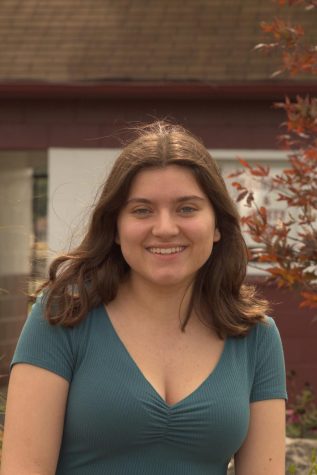
I’m Sydney Wilfong, a senior at AAHS. I’m part of the band as a proud tenor saxophone player. On the days I have time, I enjoy writing, reading and...


